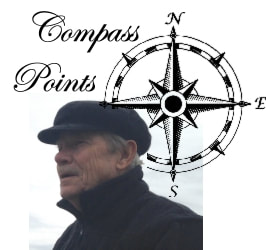 At slack tide, far off in the distance, I can see my new visitors to Thorne Bay. Beautiful black and white water birds. One group I observed had orange beaks. They all swam together in the middle of whatever part of the bay the tide had taken them. They were very easily spooked, flying off if my skiff came too close. I regretted not bringing binoculars so I could identify them enough to write them in my life's list of birds I've seen. I was sorry they were so afraid of me. For many birds (and some people) the easiest thing seems to be not even giving me a chance to get close. When I lam looking out my windows, enjoying getting to know Thorne Bay in winter, some of the wildlife will come closer to me without realizing it. My first friends at the cabin were several minks. Obviously, this year's batch. As I write this, there is one of them having lunch on my breakwater logs. He seems to be getting more comfortable with my movements in the window and doesn't run off so fast when I go outside. So, maybe I just have to be more patient with the water birds. Possibly, I should be more patient with everyone else, too. Suddenly, I'm reminded of the time John Muir took a fellow naturalist to one of his favorite spots in Yosemite, where the animals were so tame they would actually gather around him whenever he went there. How disappointed he was—after the long hike—when no animals came out, at all. It was John they were friends with. They had gotten to know him over time and the other man was a stranger. Something that makes me wonder if I could get closer to God simply by spending more time with Him, too.
0 Comments
 My favorite morning visitor. My favorite morning visitor. My great blue heron is here, today. I love his slow motion—the long slow gait of his walk--and his neck curled up behind that spear of a beak, waiting for a fish to come along. It’s a long wait. Most of the time he is just standing. I wonder if he enjoys "just looking" as much as I do. Here it is mid-October, and as I look out my window, the trees of the forest have not changed color, at all. Because this is an evergreen area, you don’t get the feel of the changing seasons. We are in the largest temperate rain forest in the world. My thoughts are turning to months of quiet to just write and look out the window.  Last days of the journey. Last days of the journey. Right now the bay is a mirror. It’s "slack tide," the twice a day event when the water is moving neither north nor south. Just sitting in one place. There aren’t many signs of life. The gulls must be up the river feasting on the last of the dying salmon. I had not realized what a rather tragic event the finishing of fishing season was. You will see something flapping on the surface, and as you get closer, you’ll see the odd color of a fish, barely able to swim. Many floating on their sides with not enough energy to right themselves. Seems a lousy ending to a beautiful life, swimming the oceans of the world.  Towing a stray log back for my collection. Towing a stray log back for my collection. I’m not sure the salmon are even aware of their impending end as they struggle with so much vigor to get up into the rivers. I once thought I might be at a place like that in my life—when all I had to look forward to was probably behind me, and I’d have to be content with just floating along. But when I didn’t feel like it and stepped out to see if there was one more adventure left in me, I made a wonderful discovery. I still had resources inside that I hadn’t even tapped into, yet. I am no salmon.  A view from every window. A view from every window. The average temperature for Southeast Alaska in September is fifty-four degrees. June through September varies by only four degrees. We live on the water in a float house. In the evening the seals climb one of our breakwater logs and sleep for the night. I feel very guilty when I have to go outside and start the generator. That's always just a little too much noise for them. They will roll off the logs and make a big splash. |
Dave Graham At the age of seventy, when it looked like life was over, I put everything I owned in storage and went in search of a dream I thought was no longer within reach. But what if it wasn't? Archives
February 2020
Categories |





 RSS Feed
RSS Feed